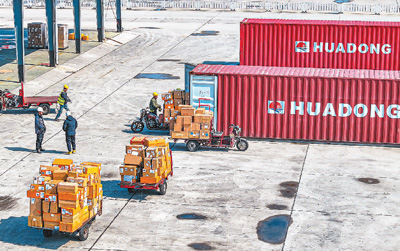China's cross-border e-commerce platforms gain popularity overseas
An increasing number of overseas consumers now shop on Chinese cross-border e-commerce platforms.
China's e-commerce platforms claimed half of the top 10 most downloaded shopping apps worldwide in 2023, with SHEIN staying on top of the rankings, followed by Temu, which was launched by Chinese e-commerce giant Pinduoduo, according to a recent report.

Workers load goods at the Shidao Xingang port in the Shidao Administrative Zone, Rongcheng city, east China's Shandong Province. The port serves as a transit port for cross-border e-commerce. (Photo/Li Xinjun)
Temu has been well received by American consumers. It was the most downloaded app in the U.S. market on both iOS and Google Play for a long time, according to an executive of Temu.
The U.S. was the fastest-growing and highest revenue-generating major market of Temu in 2023. Temu exports over 400,000 packages daily, shipping an average of around 600 tonnes a day, over half of which are destined for the U.S.
Chinese e-commerce giant Alibaba's cross-border retail platform AliExpress gained the largest number of new users among apps in South Korea in 2023, according to a report by South Korean media.
Over 100,000 companies engage in cross-border e-commerce in China. Behind the rapid growth of cross-border e-commerce platforms is the rise of the country's manufacturing capabilities, with an increasing number of Chinese factories able to produce highly competitive products in terms of both quality and price.

Workers assemble children’s bicycles bound for Japan at a manufacturing company in Pingxiang county, Xingtai city, north China's Hebei Province. The county has supported cross-border e-commerce companies to increase their exports in recent years. (Photo/Chai Gengli)
In 2023, Shanghai's airports saw export declarations from three leading Chinese e-commerce platforms increase by more than 10 times over the previous year, according to the customs of Shanghai Pudong International Airport.
"The main reason these Chinese cross-border e-commerce platforms are so popular among global consumers is that products on these platforms maintain a clear price advantage over those on e-commerce giants like Amazon, as consumers have a strong demand for quality yet affordable products against the backdrop of global inflation," said Li Mingtao, head of the research institute at the China International Electronic Commerce Center.
Li said these platforms have a price advantage by connecting consumers directly with manufacturers, which eliminates intermediaries, and adopting shipping methods that have advantages and flexibility in terms of taxes, warehousing costs, and delivery. These platforms are still expanding their market share by offering subsidies and incentives to users, which greatly benefits consumers, Li added.
The rise of Chinese cross-border e-commerce platforms overseas has facilitated the "going global" efforts of China's small and medium-sized enterprises.

An exhibitor talks with a visitor at the 4th China Cross-border E-commerce Trade Fair in Fuzhou, capital of southeast China's Fujian Province. (Xinhua/Lin Shanchuan)
Multiple Chinese cross-border e-commerce platforms have rolled out one-stop services to assist merchants unfamiliar with cross-border e-commerce operations or who lack qualified people.
Chinese cross-border e-commerce platforms have also helped sellers ease inventory pressure. Temu introduced a new pre-sale model, where sellers ship after order confirmation so that they are not required to stock inventory in advance. SHEIN has adopted an on-demand flexible supply chain system, enabling efficient digital manufacturing while reducing inventory pressure.
These platforms have also helped sellers build their brands and improve their sustainable development capabilities.
In Duqiao township in Taizhou, east China’s Zhejiang Province, a renowned eyeglasses manufacturing hub in China, some factories serve as original equipment manufacturers of other brands. Temu assisted a local sunglass seller who owns a factory in registering its own trademark and improving product quality and packaging. As a result, the selling price and profits of the seller increased by nearly 50 percent.
To maintain the price competitiveness of products, Chinese cross-border e-commerce platforms need to adopt diversified operational strategies, provide richer products, and promote more targeted product innovation to meet increasingly diverse consumer demands, Li said.
Photos
Related Stories
- Language skills push cross-border online sales
- Chinese online stores gain popularity among Finns: report
- Southeast Asian livestreamers shine at cross-border e-commerce trade fair in Fuzhou
- 4th China Cross-border E-commerce Trade Fair kicks off in SE China's Fujian
- China issues guideline to boost e-commerce in rural areas
- Cross-border livestreams rise as strong driver of China's foreign trade
Copyright © 2024 People's Daily Online. All Rights Reserved.









